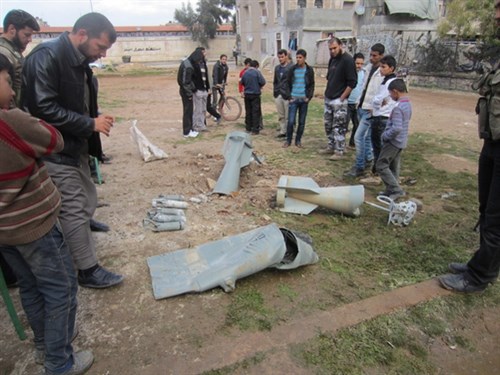31 July 2014
Treaty banning cluster bombs marks four-year anniversary
(August 1, 2014) On the fourth anniversary of it first becoming binding international law, campaigners will urge every country in the world to join the international treaty banning cluster bombs.

2 of 9 Russian made cluster bombs launched by Syrian government forces against a housing estate in Aleppo, Syria, on 1 March 2013, unexploded submunitions from a cluster bomb can be seen centre left.© Amnesty International
The call comes just days after the second anniversary of the start of ongoing use of cluster munitions against civilians in Syria, in July 2012.
“Over the past two years ongoing use of cluster bombs has caused death and devastation in Syria, and these indiscriminate weapons will continue to kill and maim civilians long after the conflict has ended. The time is now for all states to speak out against use of these deadly and banned weapons and to prioritize the protection of civilians by joining the global ban,” said Sarah Blakemore, Cluster Munition Coalition Director.
The 2008 Convention on Cluster Munitions entered into force on 1 August 2010, and bans all use of cluster munitions as well as requiring clearance of cluster munition remnants, destruction of stockpiles, and the provision of assistance for victims.
As a result of the Convention on Cluster Munitions, stockpiles of the weapon are being destroyed in record numbers, hundreds of km2 of land have been cleared and States Party to the convention are legally obliged to provide victims of cluster munitions with adequate assistance. The majority of countries with recorded victims of cluster munitions have now joined the convention.
More than half the world’s nations, a total of 113 countries, have now signed or acceded to the convention and most of the remaining 29 signatories are in the process of ratifying. This has created a powerful global stigma against the use of the weapon. When cluster munitions have been used, states have faced widespread international condemnation whether or not they are part of the convention, with more than 150 states speaking out against use of the weapon in Syria.


